Metro’s commitment to developers was well received following our informal “Coffee Chat” event designed to foster connections between and among Metro and the developer community.
Wednesday, Metro set aside some time for Developer Coffee Chats to enable dialogue between Metro’s API users and other developers. The informal event proved successful, with numerous developers taking advantage of the resources available to them (provided both by Metro and by their developer peers). Although several topics were discussed, the clear focal point was Metro’s Real-Time Train Position API, released last week through the General Manager’s CARe Initiative.
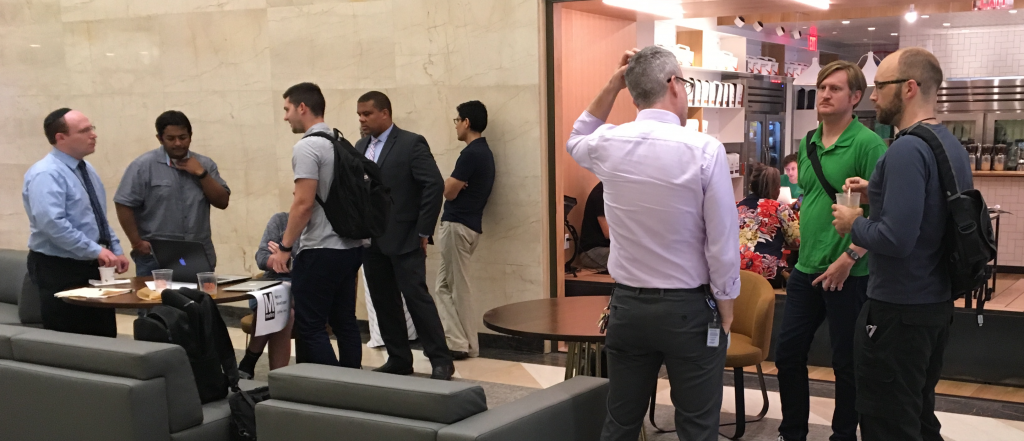
Metro staff members engaged in various dialogues with third-party developers
At the event, several developers spoke with Metro’s API team to seek guidance regarding the technical backend of their apps and others simply showed Metro their work for feedback and suggestions for implementing new features. One attendee commented on the quality of Metro’s API documentation, crediting the documentation with enabling him to move from building local-apps and scripts to building a full-fledged Metro app using the APIs. Read more…
Starting Wednesday, July 27th, Metrorail customers can see their own, personal on-time score for trips that they’ve taken over the past 90 days by logging into the SmarTrip website.
Metro has a long history of reporting system-wide performance via our quarterly Vital Signs reports. However, our customers often say that this information doesn’t resonate with their own experience because it averages things out across all operating hours and all stations.
Customers: we heard you! MyTripTime reports your own, personal on-time score based on every trip that you’ve taken over the past 90 days.
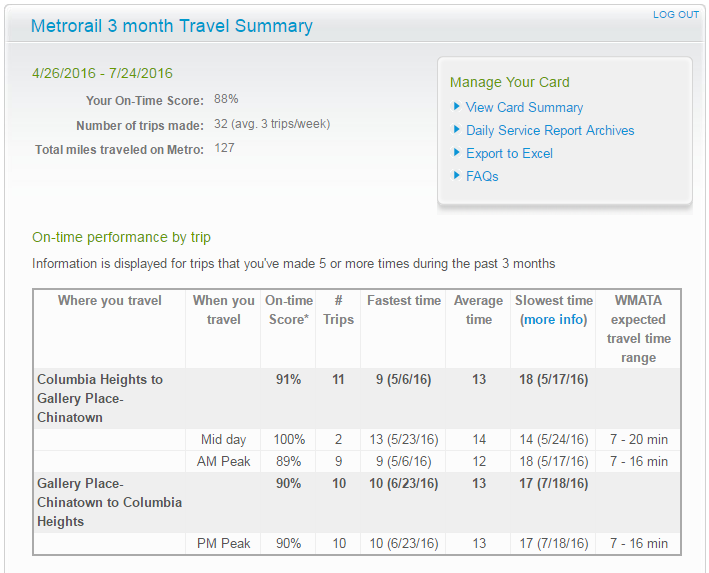
Screenshot of MyTripTime, from smartrip.wmata.com
Read more…
Metro is committed to working with the developer community – we’ve launched a real-time train position API, are hosting developer coffee chats this Wednesday (7/27) from 4pm to 6pm, created a developer google group, and are seeking submissions for an App Gallery!
If you frequently monitor Metro news, you’ll have already seen some of Metro’s latest developments regarding the commitment to open data and third-party developers. Most notably, Metro last week released a real-time train position API, making it possible to identify the specific locations of trains in the system at a given time.
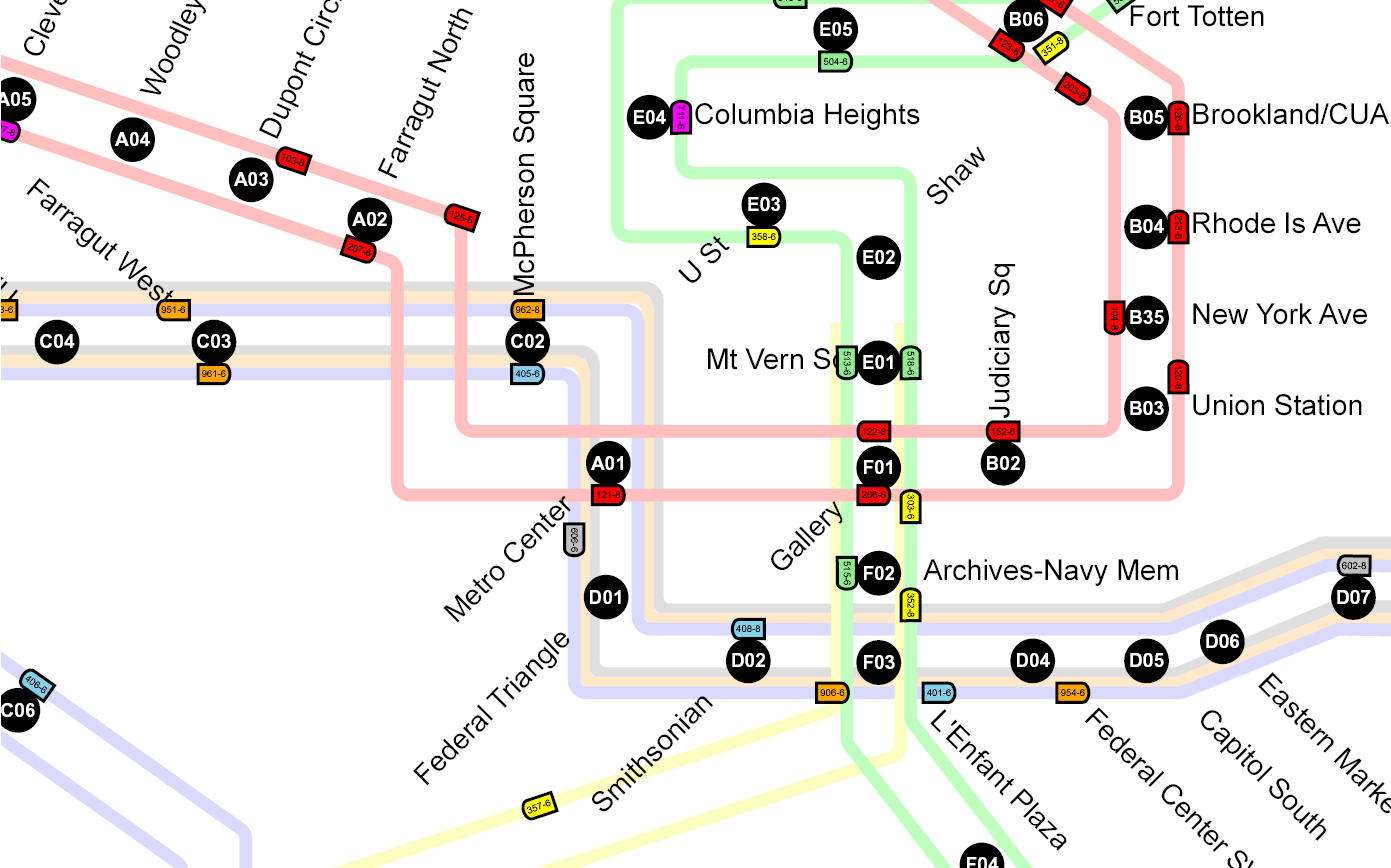
Screen capture of Metro’s internal real-time train positions map. Now, third-party developers can make their own versions of this using a recently released data feed.
We can’t wait to see what you do with the data. But we know you’ll have questions. That’s why we’re hosting an informal “Coffee Chat” this Wednesday, July 27, at Compass Coffee on F Street (near the Gallery Place-Chinatown station and 70/74/D6 buses). Stop by any time from 4pm to 6pm to say hello, show us something on your computer, or ask us questions!
Two other notable updates, Metro now has created a google group to serve as the intra-developer community forum and will be launching an “App Gallery” to showcase apps available for the Metro system.
Metro shared its Station Area Investment Plan with the APTA Rail Conference attendees – and met with rave reviews.
I recently had the opportunity to present our Station Area Strategic Investment Plan to the over 1,500 attendees at APTA’s Rail Conference. Many thanks to APTA’s Sustainability and Urban Design Standards program for footing the bill for this trip to Phoenix. It was 117 degrees there, and tested even my desire for walkable urbanism, but that’s another story entirely.

The presentation highlighted the Office of Planning’s work to quantify the return on investment of station area accessibility improvements, work with local jurisdictions, to prioritize these improvements based on an analytical platform, and identify the appropriate funding mechanisms to get these improvements built.
Read more…
Prince George’s County’s bold new vision for transit-oriented development deserves attention and support!
For more than a decade, regional planners and economic development officials have lamented the relative lack of development around Prince George’s County Metrorail stations, and yours truly had opportunities to challenge its leadership to up its game in accelerating transit-oriented development policy and practice more than a few times. On this blog, we’ve highlighted how lack of development has hindered ridership growth from the County, and we’ve articulated the benefits that would accrue to the region if Prince George’s County were to achieve the development potential of its Metrorail stations – in fact, Metrorail might just run an operating surplus if those areas were developed.
Now we all have reason to cheer and hope that these challenges and aspirational goals might be more than just wish lists and a hope certificate.
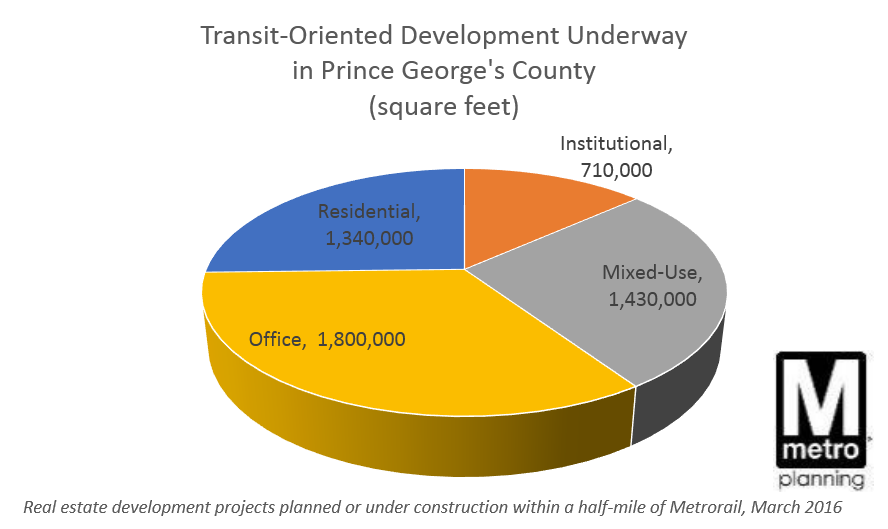 Read more…
Read more…
Adding a London-style cordon charge (or fee) to enter much of the region’s central employment area would increase transit ridership across all modes and also reduce (or eliminate) the subsidy that local governments pay every year to support Metro, meaning lower tax bills for regional residents.*
(This post is part of a multi-part series about ConnectGreaterWashington (CGW) a study that WMATA completed in 2015 and its application of land use and pricing as a transportation strategy.)
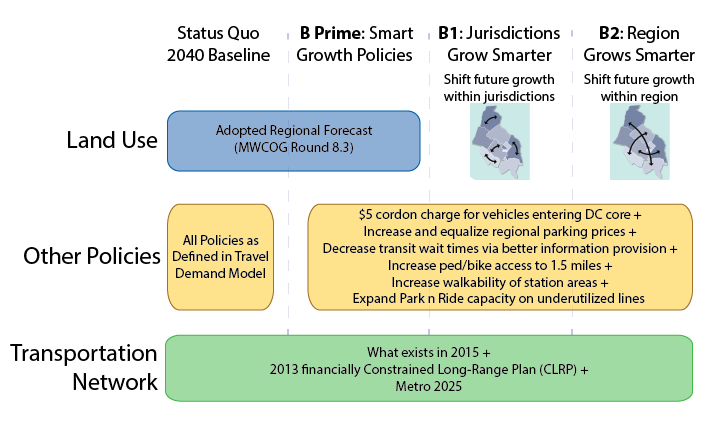
Scenario “B” looked at land use shifts and increasing the price of driving, and how those changes would impact Metro.
Metro asked, “What if the region’s future growth was used to fulfill the expectations of regional plans such as Region Forward and Place + Opportunity? What if transit-supportive policies were implemented across the region? Would WMATA benefit? Would the region?”
Answer: YES!!
*Note that Metro is not proposing that the region adopt a cordon charge, but it was tested as part of an analysis of how smarter land use and more transit-supportive policies could impact transit ridership, our operating subsidy, and other measures that support the region’s growth.
Read more…
Categories: Land Use Alternatives Tags: access, benefits, business case, forecasts, funding, land use, Metrorail, planning, rail, ridership, studies, transit-oriented development







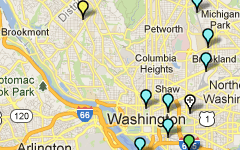
Recent Comments